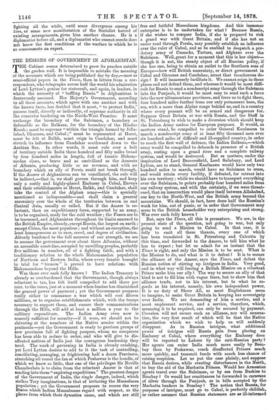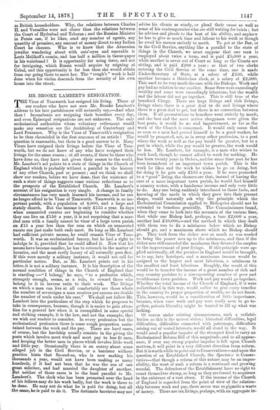THE DESIGNS OF GOVERNMENT IN AFGHANISTAN. T HE Cabinet seems determined
to grow its peaches outside the garden wall. It is impossible to mistake the meaning of the accounts which are being published day by day,—now as semi-official papers in the Times, then in letters from a cor- respondent, who telegraphs across half the world his admiration of Lord Lytton's genius for statecraft, and again, in leaders, in which the necessity of "baffling Russia" in Afghanistan is dexterously assumed. Her Majesty's Government, according to all these accounts, which agree with one another and with the known facts, has decided that it must, "to protect India," possess itself, directly or indirectly, of supreme authority in all the countries bordering on the North-West Frontier. It must exchange the boundary of the Suleiman, a boundary as defensible as the Balkans, for the boundary of the Hindoo Koosh ; must be supreme "within the triangle formed by Jella- labad, Ghuznee, and Cabul ;" must be represented at Herat, must be felt at Balkh, must reign in Candahar, and must stretch its influence from Candahar southward down to the Arabian Sea. In other words, it must rule over a belt of territory outside India three hundred and fifty miles broad by four hundred miles in length, full of fanatic Mahom- medan clans, as brave and as uncivilised as the Arnauts of Albania, producing little or no revenue, and with no boundary which an ally of Persia could not break through. If the Ameer of Afghanistan can be conciliated, the rule will be indirect,—that is, we shall govern through him, and keep only a costly and highly-placed Embassy in Cabul, Envoys and their establishments at Herat, Balkh, and Candahar, shall take the control of the Afghan army—this is specially mentioned as indispensable—and shall claim a general suzerainty over the whole of the territories between us and Central Asia, usually so called. But if the Ameer is re- luctant, then an expeditionary force, supported by an army, is to be organised, ready for the cold weather ; the Passes are to be traversed, and Afghanistan throughout its limits annexed to the British Empire, already, except Russia, the largest on earth ; except China, the most populous ; and without an exception, the least homogeneous as to race, creed, and degree of civilisation. Already burdened to the full measure of our strength, we are to assume the government over about three Albanias, without an accessible coast-line, occupied by unwilling peoples, probably five millions in number, all of a fighting faith, and with a traditionary relation to the whole Mahommedan population of Northern and Eastern India, where every fanatic brought to trial for " treason " is proved to have relations with Mahommedans beyond the Hills.
Was there ever such folly known ? The Indian Treasury is already so overburdened that the Government, though always reluctant to tax, has felt itself compelled to add three per cent. to the taxes, just at a moment when famine has diminished the general power of payment ; yet the Government prepares coolly either to commence a war which will cost fifteen millions, or to organise establishments which, with the troops necessary to support them, and ensure their communications through the Hills, will add at least a million a year to the military expenditure. The Indian Army even now is scarcely sufficient for security—if it were, we should not be shivering at the numbers of the Native armies within the peninsula—yet the Government is ready to garrison groups of new provinces full of fighting paupers, whom no conqueror has been able to reduce to order, and who will give to dis- affected natives of India just the courageous leadership they need. The work of governing in India is already crushing, yet Lord Lytton desires to add to it the task of controlling, conciliating, managing, or frightening half a dozen Provinces, stretching all round the fan of which Peshawur is the handle, of which we know so little, that one of the privileges Sir Neville Chamberlain is to claim from the reluctant Ameer is that of sending into them" exploring expeditions." The greatest danger of the Government of India, the single danger, indeed, which strikes Tory imaginations, is that of irritating the Mussulman population ; yet the Government proposes to coerce the very States which Indian Mussulmans regard with respect, as the places from which their dynasties came, and which are still free and faithful Mussulman kingdoms. And this immense enterprise is to be undertaken for what ? Because Ruasia, if she wishes to conquer India, if she is prepared to risk a grand war with Great Britain, and if she has not an easier road through Persia, may possibly establish an influence over the ruler of Cabul, and so be enabled to despatch a pre- datory army of Cossacks, Tartars, and Afghans over the Suleiman. Well, grant for a moment that this is her object though it is not, the steady object of all Russian policy, if she has one, being to obtain an outlet to the Southern seas of Europe—how will British suzerainty, or direct government in Cabul and Ghuznee and Candahar, arrest that treacherous de- sign ? It will immensely facilitate it. We cannot reign in these places and not defend them, and whereas it would be most diffi- cult for Russia to send a nondescript army through the Suleiman into the Punjaub, it would be most easy to send such a force into the new ultramontane provinces, and force US to fight there, four hundred miles further from our only permanent base, the sea, with a more than Alpine range behind us, and in a country where every peasant will be an armed and dangerous foe.. Suppose Great Britain at war with Russia, and the Staff in St. Petersburg to wish to make a diversion which should keep the Indian Army useless for European purposes. It would, as matters stand, be compelled to order General Kaufmann to march a nondescript army of at least fifty thousand men over six hundred miles of difficult and ill-supplied country, in order to reach the first wall of defence, the Indian Balkans,—which army would be compelled to debouch in presence of a British army, resting upon a grand river and a complete railway system, and would be destroyed. But as matters, under the inspiration of Lord Beaconsfield, Lord Salisbury, and Lord Lytton, are to stand, General Kaufmann would have only two hundred miles to march, would have no Suleiman to cross, and would retain every facility, if defeated, for retreat into- his own territory ; while we should have to transport everything over the Suleiman, to points probably four hundred miles from our railway system, and with the certainty, if we were threat- ened, that an insurrection would place itself between Allahabad, our key to the North-West, and the British army beyond the mountains. We should, in fact, have done half the Russian's work for him, out of panic, or in order that Government may seem to the British householder very enterprising and strong. Was ever such folly known?
But, says the Times, all this is premature. We are, in the present state of the question, not going to war, but only going to send a Mission to Cabul. In that case, it le folly to emit all these threats, every one of which has been translated in St. Petersburg and Calcutta by this time, and forwarded to the Ameer, to tell him what he has to expect ; but let us admit for an instant that the Times is right, and only the Mission is to be sent. What is the Mission to do, and what is it to defeat ? It is to secure the alliance of the Ameer, says the Times, and defeat the notion of stirring up intrigues in India. Very good, and in what way will forcing a British Mission on a reluctant Prince make him our ally? The way to secure an ally of that kind is not to fill him with vague fears, but to show him that alliance tends, not to his interest, but to what he re- gards as his interest, namely, his own independent power. It is no duty of Shere Ali, as most Englishmen seem to imagine, to assist Great Britain in keeping her sovereignty over India. We are demanding of him a service, and a most unpleasant service, and a service, therefore, which, assuming it to be required, can only be secured by payment. Coercion will not secure such an alliance, nor will annexa- tion, the very first result of which will be that the Native organisation which we wish to help us will suddenly disappear. As to Russian intrigue, what additional power of intrigue will Russia gain from placing an Embassy at Cabul, where everything the Embassy does will be reported to Lahore by the anti-Russian party? Her agents can enter India much more easily by Bom- bay than by Peshawtm reach disaffected Princes much more quickly, and transmit funds with much less chance of raising suspicion. Let us put the case plainly, and suppose that Russia desires, while creating disturbances in the North, to buy the aid of the Marhatta Princes. Would her Armenian agents travel over the Suleiman, or by sea from Bushire to Bombay ? Or would her remittances be forwarded in caravans of silver through the Punjaub, or in bills accepted by the Marhatta bankers in Bombay? The notion that Russia, for purposes of intrigue, must go to Cabul, is perfectly childish, or rather assumes that Russian statesmen are as ill-informed as British householders. Why, the relations between Charles II. and Versailles were not closer than the relations between the Court of Hydrabad and Teheran ; and the Russian Minister in Persia can, if he likes, send any number of agents, any quantity of promises, any amount of money direct to any Indian Court he chooses. Who is to know that the Armenian jeweller wandering about with cats'-eyes and emeralds is Loris Melikoff's cousin, and has half a million in tissue-paper in his waistband ? It is opportunity for using force, and not for intriguing, which Russia would acquire by reigning at Cabul, and this opportunity is far less than she would obtain from our going there to meet her. The " rough's " work is half done when his victim descends from the security of his own house into the street.































 Previous page
Previous page